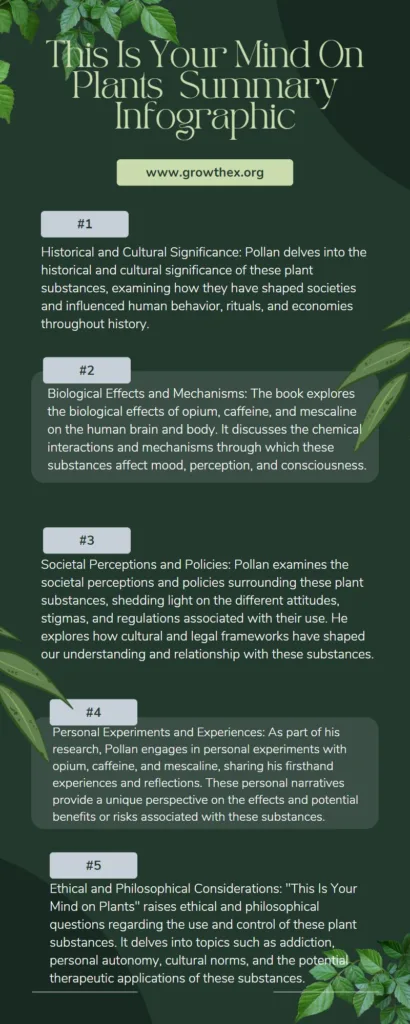This Is Your Mind On Plants examines how the effects of three conscious-altering drugs that humans have used for thousands of years—opium, caffeine, and mescaline—have shaped our bodies, culture, and history. It demonstrates that, beyond debating their legalities, we must comprehend their potential to help us connect with nature and ourselves in new ways.

One of the earliest medications we are aware of is opium and its derivatives. For thousands of years, we have used them as recreational drugs, pain relievers, and sleep aids.
One of the most commonly used psychoactive substances worldwide is caffeine. Tea leaves and coffee beans both contain it. Additionally, it affects the central nervous system by obstructing brain adenosine receptors. Heart rate and alertness both rose as a result of this.
Cacti contain the alkaloid mescaline, which when consumed can lead to hallucinations. Since ancient times, we have also utilized it for leisure, and it is still widely employed today.
What do these three components share, then? This Is Your Mind On Plants by Michael Pollan aims to provide in-depth study on plants and detailed descriptions of their impacts.
Coffee can be good for or bad for your health, depending on when you drink it.
You can benefit from and harm from coffee. Since coffee is a stimulant, it affects your body in two different ways. It first speeds up your metabolism, blood pressure, and heart rate. Additionally, it can keep you alert.
Caffeine, which is also present, can aid in the body’s dopamine and norepinephrine release. You may feel more concentrated and awake thanks to these hormones. Coffee can disrupt a restful night’s sleep because it can persist in your system for 12 hours.
Deep sleep is essential for your general health and wellbeing, particularly for your brain and memory. The amount of sleep you get each night is crucial since your brain needs rest in order to work correctly.
If you don’t, it may eventually result in issues like despair, anxiety, and even Alzheimer’s disease! It’s important to get deep sleep, not just any sleep. That, however, can be challenging to accomplish if you consume too much coffee.
Making your own opium tea is somewhat against the law and won’t give you the desired high.
Opium is a very strong analgesic that can be made from a number of plants. However, it can also be isolated from other closely related plants like lettuce and poppies. The most popular form comes from the poppy flower.
Opium’s active component is morphine, which is also found in many prescription drugs today, including hydrocodone (Vicodin) and oxycodone (Oxycontin). Morphine and its derivatives, such as codeine, are also found in opium.
These medications inhibit pain signals from reaching our brains by acting on opioid receptors in the spinal cord and brain, as well as producing a feeling of euphoria by releasing dopamine into the bloodstream.
In most nations, it is against the law to grow opium poppy plants, but it is possible. Online retailers sell opium poppy seeds, which are simple to sow. When your poppy plants are mature, you can gather the blooms to brew tea.
This won’t make you euphoric; rather, it acts as a light sedative that may put you to sleep. There are various ways for you to get the same effects as opium without breaking any laws.
Mescaline may not taste pleasant, but it can have an interesting effect on how you perceive your surroundings.
A hallucinogenic substance called mescaline momentarily changes how our brains interpret information. The author claims that mescaline makes everything extremely exciting.
This implies that we now perceive the world differently. We gain a deeper understanding of what we observe and expand on what we already know. Everything around us enlarges to the point of wonderment.
Things that were previously invisible or at least undervalued are now visible to us. For instance, we can appreciate a flower’s beauty or a rock’s power.
Mescaline also alters how we perceive time and space, making it seem as though time has sped up or slowed down, that we are moving more quickly or slowly than usual, or that distances are more or smaller than they actually are.
This Is Your Mind on Plants Book Review
Michael Pollan’s book “This Is Your Mind on Plants” is a fascinating examination of how humans interact with three unique plant allies: opium, caffeine, and mescaline. In this thought-provoking and fascinating journey, Pollan explores the history, science, and cultural influence of these mind-altering substances using comprehensive research.
Personal experiences, scientific research, and historical accounts are seamlessly woven together in Pollan’s engrossing and immersive writing style. He offers readers a fair-minded analysis of the advantages and dangers of these plants, challenging them to reevaluate their own understanding of altered states of consciousness as well as society conventions.
One of the book’s merits is Pollan’s ability to deftly combine a variety of subjects, such as botany, medicine, spirituality, and social dynamics. He explores the intricate network of interactions between people and these plants, illuminating the social, political, and economic factors that have influenced our knowledge of and usage for them.
Additionally, Pollan’s introspective style lends the tale a personal touch and invites readers to reflect on their own relationship with mind-altering substances and the effects they have on both our individual and societal well-being.
The exploration “This Is Your Mind on Plants” goes beyond the simple recreational or therapeutic use of plants. It questions cultural expectations and nudges readers to evaluate their own viewpoints on altered states of consciousness and the function of these plants in our daily lives. With his renowned investigative skills, Pollan provides readers with a fascinating and enlightening book that will give them a better understanding of our complex relationship with plants and their impact on our minds.

If you really like this “This Is Your Mind On Plants Book Summary” by Growthex then you can also check out some more amazing posts | summaries which are freely available on this platform :